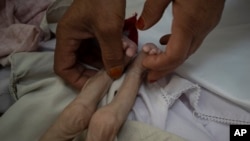Humanitarian experts warn that more than 24 million people, or 59% of Afghanistan’s population, are living on starvation diets and forced to take extreme measures to survive.
Eight senior emergency experts from U.N. and non-governmental organizations recently concluded a five-day mission to Afghanistan. They describe the level of humanitarian needs as unprecedented. They say they are shocked at the enormity of human suffering they witnessed.
The experts say many Afghans will not survive the dire conditions under which they are living without international support. And this, they note is severely lacking. The U.N. Office for the Coordination of Humanitarian Affairs reports only 13 percent of the United Nations’ $4.44 billion appeal for this year has been funded.
OCHA spokesman Jens Laerke told VOA the competition for donor support from a myriad of countries including Ukraine, Yemen, and the Democratic Republic of Congo is intense and growing. Nevertheless, he said the plight of the Afghan people must not and cannot be ignored.
“People’s reserves are exhausted, forcing many into harmful coping mechanisms to survive, including child marriages and child labor. Women and girls in particular are affected with their human rights, participation in society, their ability to work, and access to education under threat,” he said.
Laerke said the number of people requiring lifesaving assistance has risen 30% since the Taliban takeover of the country in August. He said the consequences of not responding to their needs are very stark.
“It simply means that women who are pregnant will not have a hospital to go to for giving birth…We talk about girls and their access to school but here — this means that nobody goes to school… Peoples’ need for nutrition and food will not be met. People simply will not have enough to eat. They will starve,” he said.
Laerke said donors’ fear that their money will go to the Taliban and not toward helping the Afghan people is unwarranted. He said all the money goes to the U.N. and private humanitarian organizations for which it is intended.
Over the past months, he says aid agencies have been able to scale up their operations without interference to provide life-saving assistance to people in desperate need.





